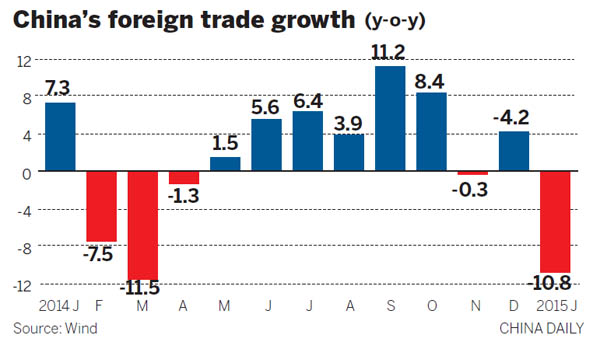


China's foreign trade stumbled by 10.8 percent to 2.09 trillion yuan ($341 billion) on a year-on-year basis in January, pushing the country to accelerate the pace of restructuring.
The country's exports slid 3.2 percent to 1.23 trillion yuan and imports slumped 19.7 percent to 860 billion yuan, expanding the trade surplus by 87.5 percent to 366.9 billion yuan, according to General Administration of Customs data released on Sunday.
The sharp import decline was led by a drop in foreign commodities as coal tumbled by nearly 53.2 percent, refined oil dropped by 37.6 percent and steel slid by 14.7 percent from the same month a year earlier.
"The weak manufacturing activities and a bearish housing market have caused domestic demand for commodities including refined oil, industrial metals and plastics to decline," said Zhao Zhongxiu, a trade professor at the University of International Business and Economics in Beijing.
Zhao said the trade surplus, combined with a downturn in exports and imports, complicates the government's management of exchange rates after January's depreciation.
Exports fell by 4.4 percent to the European Union, 10.9 percent to Hong Kong and 20.4 percent to Japan. Shipments to Russia plunged 42.1 percent.
"Even though the People's Bank of China, the central bank, so far has responded to the weakness by cutting interest rates and the amount of reserves banks must hold back when lending, the measures were only seen as holding the line," said He Jingtong, a professor of international trade at Nankai University in Tianjin.
He said policymakers should introduce more easing policies to reinvigorate growth.
China's yuan fell 2.5 percent in 2014 and has lost another 0.6 percent so far in 2015, providing some relief to exporters after four years of uninterrupted appreciation.
China became the world's largest merchandise trader in 2013, but its foreign trade slowed significantly compared with the levels that prevailed before the 2008 global financial crisis. That crisis had a lasting impact on demand in the United States and the EU. At the same time, rising domestic costs have made China's products less competitive.
Zhang Ji, director general of the Department of Foreign Trade at the Ministry of Commerce, said developed nations are revitalizing their export sectors through reindustrialization and trade protection policies.
The era of fast trade growth that China experienced in the past three decades may be gone, Zhang said.
In the past half decade, China has also been losing its advantages — including skilled labor, sound infrastructure and industrial facilities — as many industries and orders move to other markets such as Southeast Asia and India.
"As external markets will not fundamentally improve for the rest of this year, China must speed up its restructuring of regional trade and value chains, including expanding the global use of its currency, and facilitating regional trade through more free trade agreements and connectivity programs," Zhang said.
 PLA soldiers operating vehicle-mounted guns in drill
PLA soldiers operating vehicle-mounted guns in drill Beauties dancing on the rings
Beauties dancing on the rings Blind carpenter in E China's Jiangxi
Blind carpenter in E China's Jiangxi Top 10 highest-paid sports teams in the world
Top 10 highest-paid sports teams in the world In photos: China's WZ-10 armed helicopters
In photos: China's WZ-10 armed helicopters UFO spotted in several places in China
UFO spotted in several places in China Certificates of land title of Qing Dynasty and Republic of China
Certificates of land title of Qing Dynasty and Republic of China  Cute young Taoist priest in Beijing
Cute young Taoist priest in Beijing New film brings Doraemon's life story to China in 3D
New film brings Doraemon's life story to China in 3D China-S.Korea FTA sets positive precedent
China-S.Korea FTA sets positive precedent Ferry carrying 458 people sinks in Yangtze River
Ferry carrying 458 people sinks in Yangtze River Mecca of Marxism
Mecca of Marxism Bring them home
Bring them homeDay|Week